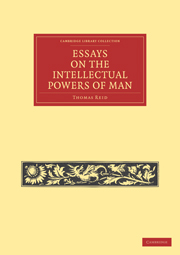
-
Select format
-
- Publisher:
- Cambridge University Press
- Publication date:
- 07 September 2011
- 30 June 2011
- ISBN:
- 9780511997150
- 9781108029698
- Dimensions:
- Weight & Pages:
- Dimensions:
- (297 x 210 mm)
- Weight & Pages:
- 1.84kg, 784 Pages
You may already have access via personal or institutional login
Book description
Thomas Reid (1710–1796) was a philosopher who founded the Scottish school of 'common sense'. Much of Reid's work is a critique of his contemporary, David Hume (1711–1776), whose empiricism he rejects. In this work, written after Reid's appointment to a professorship at the university of Glasgow, and published in 1785, he turns his attention to ideas about perception, memory, conception, abstraction, judgement, reasoning and taste. He examines the work of his predecessors and contemporaries, arguing that 'when we find philosophers maintaining that there is no heat in the fire, nor colour in the rainbow … we may be apt to think the whole to be only a dream of fanciful men, who have entangled themselves in cobwebs spun out of their own brain'. Written by one of the Scottish Enlightenment's most important thinkers, this work brings to life the intellectual debates of the time.
Contents
Metrics
Altmetric attention score
Full text views
Full text views help Loading metrics...
Loading metrics...
* Views captured on Cambridge Core between #date#. This data will be updated every 24 hours.
Usage data cannot currently be displayed.
Accessibility standard: Unknown
Why this information is here
This section outlines the accessibility features of this content - including support for screen readers, full keyboard navigation and high-contrast display options. This may not be relevant for you.
Accessibility Information
Accessibility compliance for the PDF of this book is currently unknown and may be updated in the future.


